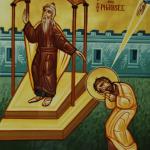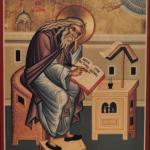
When various Christians try to engage Islam, pointing out that despite the various (and significant) differences which exists between the two faiths, they still worship the same God, other Christians quickly speak up and say it is impossible because of those very differences. It is as if they believe God is created by one’s own thoughts about God, justifying Feuerbach and others like him in saying God is created in the image of humanity instead of humanity in the image of God. If mere opinion about the various characteristics of God establish belief in a different God, no two people will worship the same God, as no two people have identical notions about God. However, God is beyond us, and our opinions about God do not form or shape who God is but only reveal what we think about God. Those differences can be important as bad ideas about God can lead to all kinds of terrible actions by those who believe them, and for this reason arguments concerning which representation of God best exemplifies the divine nature can matter, but they do not matter in relation to the question of whether or not people are seeking after and believing in the same God. Christians and Muslims share God in common, and indeed, believe many of the same things about the divine nature, including elements which come from revelation (and so not reason alone):
The Church regards with esteem also the Moslems. They adore the one God, living and subsisting in Himself; merciful and all- powerful, the Creator of heaven and earth, who has spoken to men; they take pains to submit wholeheartedly to even His inscrutable decrees, just as Abraham, with whom the faith of Islam takes pleasure in linking itself, submitted to God.[1]
Muslims recognize, with Christians that Jesus was the messiah, that he fulfilled the messianic expectations given to the people of Israel (even if they disagree with what that means). Similarly, Christians and Muslims agree that Jesus was a holy man, indeed, a prophet, but Christians also say that Jesus, along with being a man and a prophet like unto Moses, is also God, a belief which Muslims reject. Likewise, Christians see something soteriological in the life and work of Jesus, a work which included Jesus’ death on the cross. Muslims, of course, have a different picture of Jesus’ life, and so give a different meaning to it, though, what that difference entails is not so easy to discern because there has been a variety of suggested meanings given to it from the Islamic tradition. Some, indeed, currently the majority, deny Jesus’ death on the cross, though this position is not one which is necessitated by the Qur’an. What Qur’an actually says is ambiguous:
That they said (in boast), “We killed Christ Jesus the son of Mary, the Messenger of Allah”;- but they killed him not, nor crucified him, but so it was made to appear to them, and those who differ therein are full of doubts, with no (certain) knowledge, but only conjecture to follow, for of a surety they killed him not:- Nay, Allah raised him up unto Himself; and Allah is Exalted in Power, Wise;- And there is none of the People of the Book but must believe in him before his death; and on the Day of Judgment he will be a witness against them (Surah 4:156-9 Yusuf Ali translation).
While some might think that this says Jesus did not die, reading it carefully should show how that is not the case; it is possible to read the passage as indicating that he died, but those who said they were behind his death were wrong. Thus, Todd Lawson indicates three typical ways this passage has been interpreted:
The varieties of interpretation, whether by Muslim scholars or scholars from outside the Islamic religious tradition, encountered in the following pages may be arranged under three categories:
-
No one was crucified.
-
Jesus was crucified, but this happened only because God decided so; it was not the result of the plotting of the Jews.
-
A person other than Jesus was crucified. This is the view most widely held in the contemporary Muslim world. [2]
An example of how to follow through with the second interpretation is to suggest that Jesus died on the cross, but that happened, not because of the people contending against him, but because it was the intention of God. Christians certainly can and do say the same thing, which is why it is wrong to say that the Jews killed Christ:
True, the Jewish authorities and those who followed their lead pressed for the death of Christ; still, what happened in His passion cannot be charged against all the Jews, without distinction, then alive, nor against the Jews of today. Although the Church is the new people of God, the Jews should not be presented as rejected or accursed by God, as if this followed from the Holy Scriptures. [3]
The cross was willingly undertaken by Christ; if he did not accept it, he would not have been crucified, which is why it is wrong to blame the Jews for his death. If we read the Qur’anic account as denying the agency of the Jews in relation to the death of Jesus, we can agree with what is being said in the passage (albeit, making sure our audience understands how we come to such a conclusion).
Another way to understand the passage is to suggest it is talking about how Jesus, though he might have suffered a bodily dead, continued to live in his spirit, so that those who tried to stomp him out of existence were unable to do so. This follows other passages in the Qur’an which point this out: “Think not of those who are slain in Allah’s way as dead. Nay, they live, finding their sustenance in the presence of their Lord” (Surah 3:169 Yusuf Ali translation).
If we wanted to, we could even read Qur’anic text with a Christian hermeneutic; if we did so, we could suggest that the passage in question concerned Christ’s humanity, pointing out that Jesus died on the cross in relation to his humanity, and afterward God raised him up from the dead to vindicate him against his critics. We can understand the text, when it says Allah raised him unto himself, as implying what Christians believe, namely that God raised Jesus from the dead so that he could ascend to the right hand of God the Father, and that he will come again to judge the living and the dead. Thus, far from denying what Christians believe, the text could be read with a Christian hermeneutic as really affirming a key element of Christian faith. As such, it should be clear, the issue is not the passage in question, but how it is interpreted. While, to be sure, many within the Islamic tradition would deny the death of Jesus on the cross, this seems to be the result of apologetical debates concerning the meaning of the cross and not necessarily the teaching of Muhammad himself. It is from those debates, more than what we know was truly said by Muhammad, more than what we find within the Qur’an, which distinguishes Christian and Muslim understanding of Jesus. And it must be clear, it is because there is a debate which is going on concerning the identity of Jesus, it is the same Jesus being discussed: there would be no debate as to how we understand him if two different personages are involved. This is made especially clear when we see how both sides of the debate hold many things in common, such as the virgin birth, the belief that Jesus is the promised messiah, the teaching that he is a prophet like unto Moses, and that he was raised up into heaven and that he will come again as a judge at the end of the world.
While it is important to recognize the differences between Christians and Muslims, it is important for both to come to understand each other’s religious traditions, and the diversity of thought which is contained in them. Generalizations about the other should not be used to dismiss the other outright, nor to allow such generalizations turn the other into scapegoats ready for the slaughter. Christians and Muslims have much in common, and in that commonality, have much which they can share with and learn from each other while remaining distinct. Christians who study Islamic thought have often been inspired by it and used elements of it in theology (such as we find in the works of St. Thomas Aquinas and other scholastics); sometimes, Muslims have done the same with Christianity, even to the degree of considering the death of Jesus as having a soteriological aspect to it:
The influential scholar and jurist Al-Qāsim ibn Ibrāhīm al-Rassī (d. 246/860) founder of the Yemeni Zaydī kegak madh-hab, upheld the historicity of the crucifixion of Jesus. The precise details of his teaching on this topic are as yet unclear. But there seems to be no compelling reason to doubt that he understood the Qur’an as not denying that the historical Jesus was actually put on the cross and crucified. In one passage he explains and justifies the crucifixion of Jesus as a ‘ransom of God’. [4]
To be sure, if we were to blend the faiths in such a way as only to accept what they have in common, would be troubling. Few people, however, can be found who do such. Most take what they find compatible in the other faith and use it for their own personal enrichment, as well as showing how and why the faithful from both faith traditions can and should appreciate and respect each other while standing firm in their own particular faith tradition. When they do this, they still affirm their own faith’s unique teachings, but they are able to do it with a better understanding of where those differences come from, allowing them to them have a more productive conversation concerning those differences.
[1] Vatican Council II, Nostra Aetate. Vatican translation. ¶3.
[2] Todd Lawson, The Crucifixion and the Qur’an (London: Oneworld Publications, 2009; repr. 2013), 23.
[3] Vatican Council II, Nostra Aetate. Vatican translation. ¶4.
[4] Todd Lawson, The Crucifixion and the Qur’an, 77.
Stay in touch! Like A Little Bit of Nothing on Facebook.
If you liked what you read, please consider sharing it with your friends and family!













